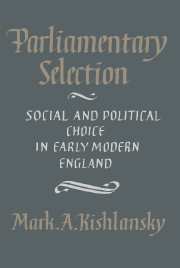7 - Contesting and Winning
from PART II - ELECTIONS AND POLITICAL CHOICE
Published online by Cambridge University Press: 22 September 2009
Summary
“No faggots, No faggots, Mr Papillon is fairly chosen.” The chaotic scene at the port of Dover in 1673 was not unlike many that took place during the by-elections to the Cavalier Parliament. The transformation in the nature of parliamentary selection meant that contests were better planned and more vigorously pursued than ever before. Whatever the attitudes of the participants, whether the old mixture of social aspiration and civic duty or the new unalloyed drive for political power and personal interest, candidates engaging in electoral contests now acted purposefully. Thomas Papillon was a man of honor and principle who conducted an incomparably scrupulous campaign. His concern for the town's welfare was paramount, his desire for its unity publicly attested. Yet never once did he consider giving way in the competition. “I will not desist or lay down on any account, but await the issue which God in his providence shall give.” Admiral Sir Edward Spragge knew little of the town of Dover and less of its traditions of selection. He pursued his seat just as he pursued the Dutch squadrons against which he had made his reputation. He spared neither men nor money to keep the wind in his sails. Spragge entered his electoral contest as he entered battle – to achieve victory.
The port of Dover, one of the ancient Cinque Ports, was dominated by its castle and its pier, physical reminders of its role in military and naval affairs. After the Restoration these twin protuberances were nominally under the government of James, Duke of York, lord warden of the Cinque Ports and lord admiral.
- Type
- Chapter
- Information
- Parliamentary SelectionSocial and Political Choice in Early Modern England, pp. 163 - 191Publisher: Cambridge University PressPrint publication year: 1986



